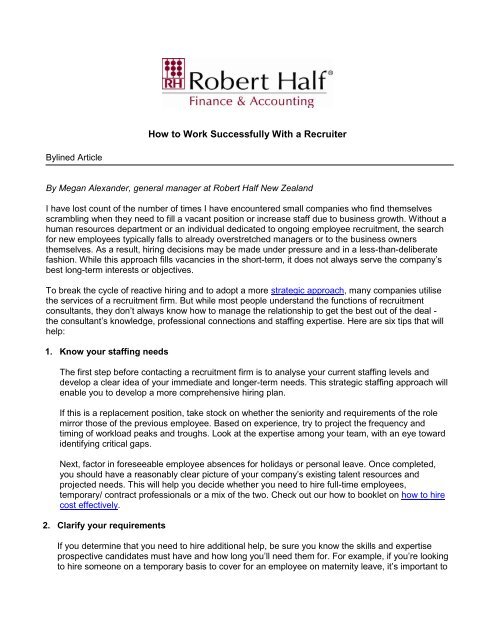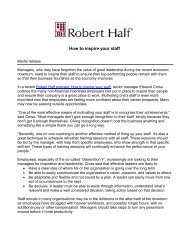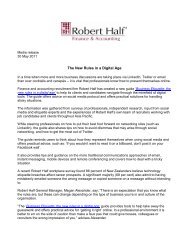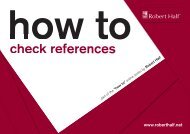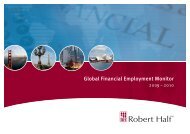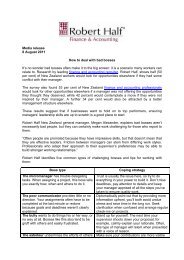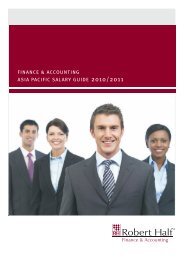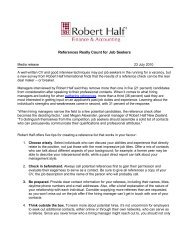How to Work Successfully With a Recruiter - Robert Half
How to Work Successfully With a Recruiter - Robert Half
How to Work Successfully With a Recruiter - Robert Half
Create successful ePaper yourself
Turn your PDF publications into a flip-book with our unique Google optimized e-Paper software.
<strong>How</strong> <strong>to</strong> <strong>Work</strong> <strong>Successfully</strong> <strong>With</strong> a <strong>Recruiter</strong><br />
Bylined Article<br />
By Megan Alexander, general manager at <strong>Robert</strong> <strong>Half</strong> New Zealand<br />
I have lost count of the number of times I have encountered small companies who find themselves<br />
scrambling when they need <strong>to</strong> fill a vacant position or increase staff due <strong>to</strong> business growth. <strong>With</strong>out a<br />
human resources department or an individual dedicated <strong>to</strong> ongoing employee recruitment, the search<br />
for new employees typically falls <strong>to</strong> already overstretched managers or <strong>to</strong> the business owners<br />
themselves. As a result, hiring decisions may be made under pressure and in a less-than-deliberate<br />
fashion. While this approach fills vacancies in the short-term, it does not always serve the company’s<br />
best long-term interests or objectives.<br />
To break the cycle of reactive hiring and <strong>to</strong> adopt a more strategic approach, many companies utilise<br />
the services of a recruitment firm. But while most people understand the functions of recruitment<br />
consultants, they don’t always know how <strong>to</strong> manage the relationship <strong>to</strong> get the best out of the deal -<br />
the consultant’s knowledge, professional connections and staffing expertise. Here are six tips that will<br />
help:<br />
1. Know your staffing needs<br />
The first step before contacting a recruitment firm is <strong>to</strong> analyse your current staffing levels and<br />
develop a clear idea of your immediate and longer-term needs. This strategic staffing approach will<br />
enable you <strong>to</strong> develop a more comprehensive hiring plan.<br />
If this is a replacement position, take s<strong>to</strong>ck on whether the seniority and requirements of the role<br />
mirror those of the previous employee. Based on experience, try <strong>to</strong> project the frequency and<br />
timing of workload peaks and troughs. Look at the expertise among your team, with an eye <strong>to</strong>ward<br />
identifying critical gaps.<br />
Next, fac<strong>to</strong>r in foreseeable employee absences for holidays or personal leave. Once completed,<br />
you should have a reasonably clear picture of your company’s existing talent resources and<br />
projected needs. This will help you decide whether you need <strong>to</strong> hire full-time employees,<br />
temporary/ contract professionals or a mix of the two. Check out our how <strong>to</strong> booklet on how <strong>to</strong> hire<br />
cost effectively.<br />
2. Clarify your requirements<br />
If you determine that you need <strong>to</strong> hire additional help, be sure you know the skills and expertise<br />
prospective candidates must have and how long you’ll need them for. For example, if you’re looking<br />
<strong>to</strong> hire someone on a temporary basis <strong>to</strong> cover for an employee on maternity leave, it’s important <strong>to</strong>
have a specific time frame in mind so that the recruitment consultant will be able <strong>to</strong> select a<br />
candidate who can commit for the duration of the assignment.<br />
In some cases, the need <strong>to</strong> hire may be driven not by a vacant position, but by a skills gap on your<br />
team. The consultant would then search for either a technical expert who can provide your<br />
company with needed expertise, or a project professional who may work with your staff on onetime,<br />
intensive tasks, such as a payroll systems conversion.<br />
Organisations are often looking for finance or accounting candidates that combine a range different<br />
skill sets, based on current gaps in their own armoury. Don’t be afraid <strong>to</strong> use your recruitment<br />
consultant as an advisor <strong>to</strong>o – they’ll be able <strong>to</strong> give you a steer on what skills are available in the<br />
market so you don’t put <strong>to</strong>gether a job description that’s impossible <strong>to</strong> fill.<br />
3. Select the right recruitment firm<br />
Finding the best firm for your unique situation can make all the difference in the success of your<br />
hiring efforts. Begin by asking colleagues and professional associations for their recommendations.<br />
Once you have a list of contenders, establish a set of questions so you can evaluate all recruitment<br />
firms using the same criteria.<br />
Your list should include the following areas:<br />
Experience. <strong>How</strong> long has the company been in business? Has it served companies with<br />
needs similar <strong>to</strong> your own?<br />
Specialisation. Which areas does the recruiting firm focus on? Is it a temporary or permanent<br />
role you are trying <strong>to</strong> fill? Some firms have consultants that specialise in either permanent or<br />
temporary services. Others, like <strong>Robert</strong> <strong>Half</strong>, have different divisions for both.<br />
Candidate-selection process. <strong>How</strong> does the recruitment firm select, screen and evaluate<br />
candidates? Does it conduct skills-assessment tests?<br />
Internal staff. <strong>How</strong> closely will the consultant work with your organisation once a relationship<br />
had been established?<br />
Quality control. <strong>How</strong> does the consultant measure performance <strong>to</strong> ensure satisfaction? Is there<br />
a guarantee if the candidate they send is not a good fit?<br />
When you’ve finished evaluating potential recruitment companies, visit each one of the finalists.<br />
This will help you get a sense of how each operates and whether its style matches your own. Be<br />
sure <strong>to</strong> meet with the consultant who will be working on your company’s behalf. You should feel<br />
confident they have the professionalism and skills <strong>to</strong> identify appropriate candidates for your<br />
organisation.<br />
4. Establish a working relationship<br />
Once selected, invite your primary consultant at the recruitment firm <strong>to</strong> visit your company. Give a<br />
<strong>to</strong>ur of your facilities and introduce the consultant <strong>to</strong> key managers and supervisors. The better<br />
your consultant understands your needs and how your business operates, the easier it will be for<br />
them <strong>to</strong> provide you with individuals who will match your requirements.
You should also feel confident your consultant knows their candidates well. If the role is permanent,<br />
your consultant should be looking for candidates who not only measure up on paper, but are a<br />
good cultural fit within your organisation. When recruiting temps on the other hand, speed is of the<br />
essence. Wait a day and you’ll risk losing a great candidate elsewhere. If your consultant is<br />
confident about a temp who can fill the gap you may not even need <strong>to</strong> meet them before they start.<br />
Reputable recruiting firms will not only screen job seekers for you but will have conducted first hand<br />
interviews with a candidate before sending the best prospects for interviews with your organisation.<br />
After meeting with candidates, fine-tune your relationship with the consultant by comparing<br />
interview notes, raising any concerns you have about individuals and providing specific feedback<br />
that will help the consultant refine the search.<br />
5. Make Time<br />
Act quickly <strong>to</strong> get the best candidates. Once you have met and briefed your consultant and they’ve<br />
put forward some candidates, keep things moving along by ensuring that you make the time for<br />
interviews. If you don’t, before you know it your best candidates will have found another role and<br />
you’ll be back <strong>to</strong> square one. Not making the time <strong>to</strong> meet with candidates can send a negative<br />
message. If you don’t have time for them, why would they want <strong>to</strong> work for you?<br />
6. Provide ongoing feedback<br />
Your working relationship with a consultant doesn’t end when you hire a candidate. Be sure <strong>to</strong> give<br />
your consultant feedback about the individual – both your own evaluation as well as comments<br />
from other team members. It’s also a good idea <strong>to</strong> ask new hires how they feel about the job and<br />
your company. This type of “360-degree” feedback will give the consultant valuable insights in<strong>to</strong><br />
your company’s culture and processes, so that they’ll be able <strong>to</strong> more rapidly provide ideal matches<br />
in the future.<br />
When managed correctly, your company’s relationship with a recruitment consultant will have many<br />
benefits. In addition <strong>to</strong> saving you time and stress, a well chosen recruiting firm can be a true<br />
staffing partner, helping your company develop a steady pipeline of qualified candidates who could<br />
become productive, valued employees.<br />
Ends<br />
Released on behalf of <strong>Robert</strong> <strong>Half</strong> Finance & Accounting by Goode PR, Auckland. For more<br />
information or <strong>to</strong> arrange an interview, please contact:<br />
Melissa Dobson of Goode PR, Auckland on +64 9 480 9948 or 021 389 559 or email<br />
melissa@goodepr.co.nz<br />
About <strong>Robert</strong> <strong>Half</strong> International<br />
<strong>Robert</strong> <strong>Half</strong> International Inc. (RHI) pioneered specialised staffing services and <strong>to</strong>day is the world’s<br />
leader in the field. Founded in 1948, the company is traded on the New York S<strong>to</strong>ck Exchange (symbol:<br />
RHI). <strong>Robert</strong> <strong>Half</strong> International again was named FORTUNE ® magazine's "World's Most Admired<br />
Companies" list, ranking #1 in our industry in both innovation and quality of services. (March 21, 2011)
<strong>Robert</strong> <strong>Half</strong> New Zealand operates the divisions <strong>Robert</strong> <strong>Half</strong> Finance & Accounting, for temporary<br />
and permanent finance professionals; <strong>Robert</strong> <strong>Half</strong> Management Resources, for project financial<br />
professionals and <strong>Robert</strong> <strong>Half</strong> Technology, for high calibre technology professionals.<br />
There are more than 350 <strong>Robert</strong> <strong>Half</strong> International locations worldwide. Visit us <strong>to</strong>day:<br />
www.roberthalf.co.nz


